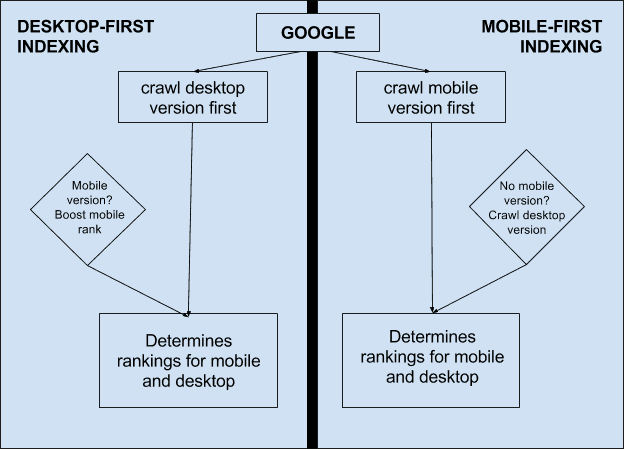A few weeks back, Google doled out its new Mobile-First Indexing strategy for the web pages. This has led to many webmasters ponder about their current rankings on the Google search engine and left them wondering if they were better off before or after these changes get in their full swing. In fact, and what appears to be an even important question, if it will even have any ranking implications at all? Speaking of ranking, this part of creating a website for your business is very important to acknowledge, especially when it comes to SEO in general. As there is quite a bit to get your head around, knowing that you can use tools like this google rank checker could coming in handy sooner than you think.
In this article, we’ll see what actually is the new Google’s mobile-first indexing all about and analyze if it will affect your overall positions on the Search Engine Result Pages (SERP).
Second, we will also see that after the rolling out of this strategy, would the mobile version of websites has an advantage over the desktop versions or vice versa?
So, first things first, let’s first understand that what actually is this so hyped, Google’s Mobile First Indexing.
What is Google’s Mobile First Indexing?
On March 26, 2018, Google announced its new set of strategies to index websites in its database which it collectively refers to as the Mobile-First Indexing.
What it actually means is that originally, the Google’s famous “bot” used to crawl and index the desktop version of the website. Now, it’s different as instead of the desktop, the bot will now take into account the mobile version of any website. In other words, the mobile version of your website will be the first reference point for Google to start indexing.
Previously, if you had a website which was serving different “content” for the visitors accessing your website via desktop or mobile using the same URL, Google would show them the content of your desktop website on its search result page. Even if you used your mobile to view the Google search result. The reason behind this is that Google has always maintained a single index for its search results and for that single index, the priority was the Desktop version instead of the mobile counterpart of the websites.
Now, thanks to the smartphone devices, year after year, more and more visitors are using their mobile devices to log queries on the Google search engine. As a result, the tables have turned 180 degrees.

Will Google’s Mobile First Indexing Affect the Current Rankings?
Short answer, No.
Long answer, I’ve done my part of the research and evaluated the Google’s announcement thoroughly and have reached to the conclusion that staying within the context of this announcement alone, the Mobile First indexing will not have any effect on your Google rankings. This means it still makes sense to reach out to companies like outreachpete.com to help boost your SEO.
As you see, this is only about the content that will be displayed on the search result page. The On-page quality of the content, will not have any impact on the “arrangement” of the search result. This was the same case with the previous practice of indexing the desktop version of the websites as well.
If it sounds a bit confusing then let me clarify it for you.
You enter a search term in the Google search bar and thanks to the highly efficient google algorithm in place, within a fraction of a second, the search result is laid out in front of you in a particular order. Now, this particular order or “arrangement” of the search result depends on the overall rankings of the web pages which Google has sorted out after applying a highly rigorous algorithm. Mobile-First Indexing does not alter this algorithm.
The only thing that changes is what information will be indexed rather than how the information is sorted and displayed in Google.
So Does This Mean You Don’t Have To Worry About Your Google Rankings?
I never meant that. The most important point to understand is that these changes will change affect the display of the content in the search results page (which as I explained above, has nothing do with the quality of the content). However, this does not mean that you don’t have to optimize your web pages. The good old unofficial rules of Search Engine Optimization stay intact as ever. The only difference is that what content of your website the visitors will see on the search result page.
So you’d need to optimize your pages for the web just like before. Does not matter the pages are for “Desktop” or “Mobile” devices. You need to make sure that your score on Google’s Page Speed Analysis remains healthy as well as you apply other off and on page optimization techniques in order to keep ranking high. If you aren’t sure about any of this and don’t know how to optimize your content, then it might be worth consulting an expert in internet marketing, like Tyler B Hovarth, the self-proclaimed “seo king“. Experts like this can help you with marketing your online business by offering support and advice.
Also Read: How to blog about any topic without being an expert?
Interaction With Neil Patel
Quite interestingly, I had a brief chat with the internet marketing guru, Neil Patel through the comments section of his blog where I mentioned my findings which are quite different than what he purports to be.
Neil Patel thinks that the new changes will, in fact, affect your rankings and those with websites specifically designed for the mobile users will enjoy a slight advantage.
I, on the other hand, have deduced that as of this date, the mobile-first indexing will not help the mobile websites gaining any higher ground.
In fact, based on what version of websites the webmasters serve (mobile, desktop or even both), they may experience changes at different levels or even no change at all.
The different scenarios can be summed up in the following manner:
What If you do not have the mobile version of your website?
In that case, your desktop version will serve as the mobile version. Google will index and therefore, display your desktop version of the website in its search results.
What if you serve different URLs for different visitors?
Traditionally, Google has suggested using different URL for the mobile versions. Such as m.domain.com
In case you follow this practice, then Google will prefer indexing the domain which entails the mobile version of your website. Which is most likely to be the one starting with the prefix of “m”.
You can read about all the case studies and see which category your website falls and how will google index it in this link. Just make sure that you read the “What’s Changing” section.
So are the Experts Wrong?
Not at all. If you read all the articles from the gurus carefully, the experts are just playing it safe. All their projections about changing Google rankings are based on some “obvious” analysis which, in a sense, does not have anything to do with the mobile-first indexing.
In essence, they are just good general SEO tips. That’s it.
How come? Let’s analyze this for a moment.
As I said above, the good old rules of optimizing your web pages aren’t going anywhere. Which means that you still have to make sure that your web pages reflect the best information on any topic that you want to rank high for.
Of course, if you do not meet these criteria very well, you wouldn’t rank high on the SERPs anyway. Does not matter if it’s the desktop or mobile version.
Now, after the Mobile First indexing, Google will index and serve your mobile versions of the websites in its search results. In case you do not have a specific mobile version, Google will display the desktop version of your website.
Now, if your desktop version does not feel good to the mobile users (which means that it isn’t mobile-responsive), most likely, they are going to leave your website.
So the “obvious” analysis is that “MAYBE” in the future, Google will start downgrading websites which are not optimized for mobile screens. In that case, websites with mobile versions of the websites will have a slight advantage over their competitors with just desktop versions which are not responsive. So this means that the websites with a mobile-responsive template will rank equally well as the mobile versions only.
So the best suggestion is to suggest webmasters is to prepare your websites for the mobile visitors as well.
And this is what’s going through the minds of the gurus.
Additionally, one more point to keep in mind is that Google never mentioned that this new policy will affect the current rankings of the websites. So if your website currently has the mobile-responsive template, even then you’re golden. There’s no need to panic at all. It will be the usual business for you.
I hope I’m making myself clear.
Also Read: Basic Keyword Research Guide Using Free Google Tools
When will Google’s Mobile First Indexing Come into Effect Completely
Google itself has remained cautious to mention any timeline. Here’s what they’ve stated about the changes. The reason is that it knows that many webmasters don’t operate different versions of their websites for their desktop and mobile visitors so immediately putting the change into effect will ruin the overall user experiences for most of the google visitors. Hence, they’re rolling out the changes gradually.
The Best Course of Action for the Webmasters
Meanwhile, since there’s no need to worry about the rankings as the new indexing policy will hardly affect the webmasters current standing in Google. However, from the “user experience (UX)” perspective, one should make sure that his website is optimized well enough for the visitors coming from either domain. For further support, contacting a Los Angeles SEO Company such as Avidon Marketing Group can ensure your website is optimized for search engines.
In that case, having a mobile-responsive website (which accommodates the data according to the screen size) looks like the best insurance policy. This will ensure that the visitors from both sides enjoy the best user experience while staying on your website.
Moreover, just to make sure that you’re on the right path to embracing the change, read the best practices for Mobile-First Indexing. The tips are from the Google itself and it also revolves mainly around the UX and nothing too radical. However, I’d highly recommend going through this article to get the idea.
Also Read: How to Check Popularity of your Blog’s Topic Ideas
Final Word
Before wrapping up and calling it a day, I believe it’s best to summarize all the important points that I think are the soul of this article. These would be:
- Google Mobile First Indexing means that Google, from now on, will index your mobile version of the website as a priority instead of the desktop version.
- Websites with the best UX for both mobile and desktop visitors will have an advantage over others.
- Mobile First Indexing will not have any direct impact on your Google rankings.
- However, just to be on the safe side, it’s highly recommended to design mobile-responsive websites. This advice was even valid when Google had the traditional “Desktop-First” indexing. So in essence, there are no significant changes expected in the web design and SEO departments following the Google’s new indexing policy


One reply on “Google’s Mobile-First Indexing & Google Rankings”
[…] Google’s Mobile-First Indexing & Google Rankings […]